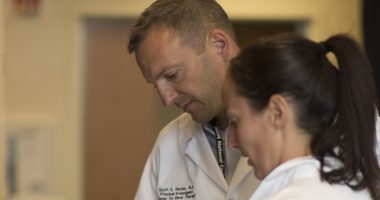HNF Relaunches GRIN Registry for CMT, Inherited Neuropathies
The database is being hosted by Across Healthcare's Matrix platform

Note: This story was updated Nov. 4, 2022, to clarify the organizations associated with this particular initiative.
The Hereditary Neuropathy Foundation (HNF) has relaunched its Global Registry for Inherited Neuropathies (GRIN), a database of people with Charcot–Marie–Tooth (CMT) disease or other inherited nerve damage disorders that’s now being hosted by Across Healthcare’s Matrix, a shared platform for rare diseases.
First launched in 2013, GRIN offers patients a place to manage their own health data and share them with caregivers, doctors, and scientists. The registry brings together genetic test results, health records, and clinical notes, all in one place.
“This information can help inform clinical trials of therapies for the 150,000 people in the U.S. who are living with Charcot-Marie-Tooth disease and have no treatment options available,” Shoshana Shendelman, founder and CEO of Applied Therapeutics, said in a press release.
The goal is to give out enough information for scientists to bear on research that’s focused on patient needs.
“HNF is committed to supporting this development with the critical data needed by industry to characterize this disease and define clinically significant outcome measures that are meaningful to patients by continually improving and expanding our GRIN platform,” Allison Moore, the foundation’s founder and CEO, said. “Furthermore, we are on a path to reach and represent a more diverse patient population and are excited that this new platform is available in seven languages and HNF has expanded resources to reach the underserved and underrepresented patient population.”
Outcome measures are important because they help translate preclinical advances to the clinic.
Inherited neuropathies are a group of diseases that affect the peripheral nervous system, which consists of the nervous system outside the brain and spinal cord. These nerves control the muscles and relay sensory information to the brain.
The symptoms depend upon the type of inherited neuropathy and may include numbness, tingling, pain in the feet and hands, muscle weakness and wasting, changes in sweating, and sensitivity to pain.
“We are humbled and honored to be working with HNF to empower anyone living with CMT and their families to track and give individualized insights through our Matrix platform while simultaneously continuing the legacy and vision of the GRIN platform to provide a robust regulatory grade international registry,” Jason Colquitt, Across Healthcare’s founder and CEO, said.
Anyone with a diagnosis of CMT or any other inherited neuropathy can join GRIN by filling in a profile. All personally identifiable details are masked to separate the identity of the participants from their data, the foundation states on the registry’s page.
Scientists at Pharnext also drew on GRIN’s data before launching a Phase 3 clinical trial called PREMIER (NCT04762758) that’s testing PXT3003 for CMT type 1A, the most common CMT subtype.
“GRIN data has been essential in clinical trial protocol design, site selection, and efficient patient recruitment,” Xavier Paoli, chief operating officer at Pharnext, said. Recruitment is complete and has exceeded the target number of participants.
HNF has contributed $140,000 into maintaining and expanding GRIN to include doctors and links to electronic health records. Also money raised from fundraising events was allocated to transfer data into Matrix. An ongoing campaign will match contributions up to $200,000 for a total of $400,000 to help fund CMT research.







